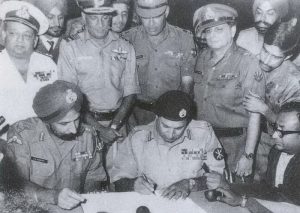The emergence of Bangladesh as an independent nation was a watershed event in the early 1970s. The founding Father of the Nation, Bangabandhu Sheikh Mujibur Rahman, declared the independence of Bangladesh on March 26, 1971. Eventually, Bangladesh emerged as a free nation from under the brutality of the Pakistan regime. The birth of Bangladesh on December 16, 1971 was influenced by the dynamics of the Cold War era. Bipolarity, alliance building, the non-aligned movement, and liberation struggles in the Third World were important factors that shaped the directions and outcomes of Bangladesh’s Liberation War. The country’s diplomatic journey through the heyday of the Cold War dawned in the maze of subcontinental politics, deeply influenced by the dynamics of the 1947 Partition. The events related to Bangladesh’s Liberation War provide a strong historical and philosophical basis for contemporary Bangladesh’s relations with India and Pakistan.
Bangladesh received critical support from different nations for the cause of liberation. Such support was instrumental to overcoming the forces and propaganda against the creation of the Bangladeshi state. India was a leading external power in supporting the emergence of a free and independent Bangladesh.
For Bangladesh, the conduct of foreign policy during the days of the Cold War and into the post-Cold War era has been deeply challenging. Over the past 50 years, India and Pakistan have prominently featured in the foreign policy of Bangladesh, demonstrating a complex cyclical patterns of inter-state relations.
Bilateral Relations With India: The Beginning
Sheikh Mujibur Rahman, often referred to as Mujib, laid the foundation of Bangladesh-India bilateral relations while he was returning to Dhaka from a Pakistani jail on January 10, 1972. With its recognition of Bangladesh on December 6, 1971, India laid down the path for a bright future in Bangladesh-India relations. A high watermark of Mujib’s statesmanship was reflected during his visit to Kolkata on February 6-8, 1972. During the visit, a joint declaration between the two countries announced the withdrawal of Indian troops from Bangladesh by March 25 of that year.
Apart from the recognition of mutual friendship and interests, both India and Bangladesh focused on certain principles to shape their bilateral relations. Domestically, the principles of socialism, democracy, nationalism, and secularism and externally, the principles of anti-imperialism, non-alignment, and peaceful coexistence guided the parameters of Bangladesh-India relations at the very beginning.
But the assassination of Mujib on August 15, 1975 plunged bilateral relations with India into a period of darkness and hostility. The assumption of power by General Zia, after a bloody coup, disrupted the healthy evolution of Bangladesh-India ties.

































